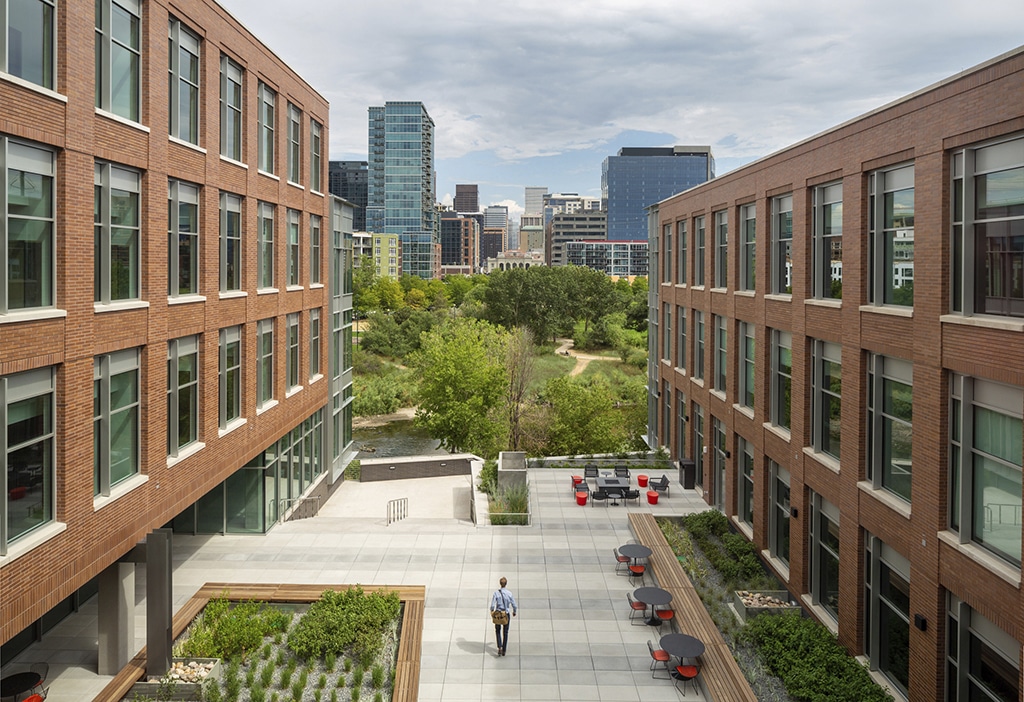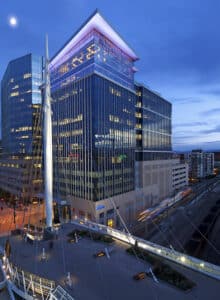
Trammell Crow’s local projects include the Riverview building at 1700 Platte St. in Denver. (Courtesy Sam Adams, Tryba Architects)
Few have spent as long thinking as much about downtown Denver as Bill Mosher.
He spent the 1990s as head of the Downtown Denver Partnership, which works to promote and manage growth of the city’s core. He stepped down in 1999 to launch his own development firm, working on projects such as The Denver Post building and the Hyatt Regency by the Colorado Convention Center.

Bill Mosher
In 2006, his firm was acquired by Trammell Crow, the Dallas-based development giant that has worked on numerous downtown projects, including the History Colorado Center and the redevelopment of Union Station.
Mosher spent 2023 transitioning duties leading Trammell Crow’s Denver office to Erik Hagevik. He retired from the firm at the end of the year.
“It’s time to have new younger blood take over,” he said. “I think it’s healthy for the organization. It’s a lot of energy and a lot of work and you need a vision in this business, particularly in the development business because, if you’re lucky, it’s three to six to seven years long (to complete a project).”
But Mosher said full-time retirement is not his plan.
“I really don’t want to retire,” he said. “It’s not my goal. I’ve never had a goal to retire, per se.”
Mosher remains CEO of the Denver Convention Center Hotel Authority, the quasi-governmental nonprofit that owns the Hyatt Regency. He noted the organization is gearing up to renovate the entire hotel, which opened in 2005.
“I told the board that I would stick around for the renovation project,” Mosher said. Work could begin this coming November and run through 2025.

Trammell Crow worked on DaVita’s headquarters building at 2001 16th St. (Courtesy Frank Ooms)
Mosher is also a board member of the National Western Center Authority and said he plans to continue mentoring those in real estate. He and wife Molly Broeren — who had a women’s apparel store downtown for decades — will travel to see kids and grandkids, and Mosher will continue cycling and skiing.
But he’s also open to finding the next thing.
“I’d like to see if there’s other opportunities maybe outside of real estate in some way,” he said. “I don’t see myself becoming an employee of somebody else. I would like to stay involved as a mentor and I’d like to find my right place in the community.”
BusinessDen spoke with Mosher in mid-December at Trammell Crow’s office at 1225 17th St.. Below are some highlights, lightly edited for clarity.
On why he joined Trammell Crow: Trammell Crow is top of the food chain from a real estate development standpoint. So it was a legendary company, it was access to capital, it was doing bigger projects. It was a good fit.
On the highlights of his career: When I look at my career at Trammell Crow, it was just an extension of all the relationships that I have. A lot of people talk about the projects and I tend to talk about all the people that I worked with, and the mayors and the cities. At one point we were working in seven different jurisdictions in Colorado. It’s the people.
On being involved with the Union Station redevelopment: It was defining for us, it was defining for the city. And doing a project like that during a recession is awesome, because it put people to work and we were able to do things at a quality that you probably wouldn’t be able to do today. Originally the plaza in front of Denver Union Station was to be concrete, for example, and we were able to put granite in because of the recession and the pricing.
On downtown now: There’s no question that this is a struggle and there’s no question that COVID and the impact on office buildings and just the vacation of pedestrian activity has really hurt downtown. I’m really worried about downtown. Frankly, I thought it would come back quicker. And I don’t think any of us realized until now, in this last year or so, that office and how we work and the idea of a Central Business District is really threatened and changing.
On remote work: I worry about what’s happening in the office market and I worry for young people. I would not be where I am today if I wasn’t in offices working with people senior to me, mentoring me, me watching them, them helping me out. You can’t do that from home. And I’m not even sure you can do it two or three days a week. Maybe you can. There’s part of me that thinks coming back together for business purposes and creative collaboration is still going to win the day. And so I think there will be a role for office. It’s just going to have to be defined differently.
On Upper Downtown’s need for a LoDo moment: I think Upper Downtown now is going to have to figure out how to redefine it. And it’s going to be painful. But when I came to the partnership, LoDo was 40 percent bank-owned, probably 80 percent vacant, vagrants. Nobody thought of LoDo as we now think of it. But everybody including the city got really focused on how do we partner with banks, how do we help on projects. We helped on individual projects. That’s how I first met Mayor Hickenlooper, was when he was doing the Wynkoop Brewing building and we helped in the financing of that — the city, the partnership. At one point I think he had seven different lenders involved, and that was a community effort to say we’ve got to come together to figure this out. And that’s what has to happen in Upper Downtown.
On the 16th Street Mall renovations: We need to finish the mall. And I think once we finish the mall and it comes back to life — because it will come back to life — there’s just going to have to be an overall focus. It’ll sort of be the Denver Union Station of Upper Downtown. Hopefully be the coalescing factor.
On the prospects for converting office buildings to residential space: I have a lot of pessimism. I think standard office buildings not so much, unfortunately. Floor plates are really important. They’ve got to be small. But I’ve looked at three or four buildings — ones with smaller floor plates, more historic buildings, have more glass — and it’s extraordinary expensive. It’s probably $10-$20 million subsidies. It’s not $2 million. It’s lots of money. And a lot of it has to do with the inefficiencies. All these (newer) apartment buildings out here are 85 to 90 percent efficient, meaning those buildings have 85 to 90 percent rental space. You look at most of these buildings downtown and you’re lucky if you get to 75 or even 70 percent efficiency, because they’ve got broad corridors, there’s a lot of unusable space. I think there’s a few buildings you could cherry pick and try and put some money into it and get them done.
On demolition: We’re probably going to lose some office buildings. They’re probably going to have to be torn down at some point. You know, Evan Makovsky made that comment at one of your events. And everybody was like, Oh my gosh. But there’s going to have to be a transition in Upper Downtown.
The takeaway: I think the 16th Street Mall opening, tied with a concerted redevelopment strategy for Upper Downtown, is what needs to happen.

Trammell Crow’s local projects include the Riverview building at 1700 Platte St. in Denver. (Courtesy Sam Adams, Tryba Architects)
Few have spent as long thinking as much about downtown Denver as Bill Mosher.
He spent the 1990s as head of the Downtown Denver Partnership, which works to promote and manage growth of the city’s core. He stepped down in 1999 to launch his own development firm, working on projects such as The Denver Post building and the Hyatt Regency by the Colorado Convention Center.

Bill Mosher
In 2006, his firm was acquired by Trammell Crow, the Dallas-based development giant that has worked on numerous downtown projects, including the History Colorado Center and the redevelopment of Union Station.
Mosher spent 2023 transitioning duties leading Trammell Crow’s Denver office to Erik Hagevik. He retired from the firm at the end of the year.
“It’s time to have new younger blood take over,” he said. “I think it’s healthy for the organization. It’s a lot of energy and a lot of work and you need a vision in this business, particularly in the development business because, if you’re lucky, it’s three to six to seven years long (to complete a project).”
But Mosher said full-time retirement is not his plan.
“I really don’t want to retire,” he said. “It’s not my goal. I’ve never had a goal to retire, per se.”
Mosher remains CEO of the Denver Convention Center Hotel Authority, the quasi-governmental nonprofit that owns the Hyatt Regency. He noted the organization is gearing up to renovate the entire hotel, which opened in 2005.
“I told the board that I would stick around for the renovation project,” Mosher said. Work could begin this coming November and run through 2025.

Trammell Crow worked on DaVita’s headquarters building at 2001 16th St. (Courtesy Frank Ooms)
Mosher is also a board member of the National Western Center Authority and said he plans to continue mentoring those in real estate. He and wife Molly Broeren — who had a women’s apparel store downtown for decades — will travel to see kids and grandkids, and Mosher will continue cycling and skiing.
But he’s also open to finding the next thing.
“I’d like to see if there’s other opportunities maybe outside of real estate in some way,” he said. “I don’t see myself becoming an employee of somebody else. I would like to stay involved as a mentor and I’d like to find my right place in the community.”
BusinessDen spoke with Mosher in mid-December at Trammell Crow’s office at 1225 17th St.. Below are some highlights, lightly edited for clarity.
On why he joined Trammell Crow: Trammell Crow is top of the food chain from a real estate development standpoint. So it was a legendary company, it was access to capital, it was doing bigger projects. It was a good fit.
On the highlights of his career: When I look at my career at Trammell Crow, it was just an extension of all the relationships that I have. A lot of people talk about the projects and I tend to talk about all the people that I worked with, and the mayors and the cities. At one point we were working in seven different jurisdictions in Colorado. It’s the people.
On being involved with the Union Station redevelopment: It was defining for us, it was defining for the city. And doing a project like that during a recession is awesome, because it put people to work and we were able to do things at a quality that you probably wouldn’t be able to do today. Originally the plaza in front of Denver Union Station was to be concrete, for example, and we were able to put granite in because of the recession and the pricing.
On downtown now: There’s no question that this is a struggle and there’s no question that COVID and the impact on office buildings and just the vacation of pedestrian activity has really hurt downtown. I’m really worried about downtown. Frankly, I thought it would come back quicker. And I don’t think any of us realized until now, in this last year or so, that office and how we work and the idea of a Central Business District is really threatened and changing.
On remote work: I worry about what’s happening in the office market and I worry for young people. I would not be where I am today if I wasn’t in offices working with people senior to me, mentoring me, me watching them, them helping me out. You can’t do that from home. And I’m not even sure you can do it two or three days a week. Maybe you can. There’s part of me that thinks coming back together for business purposes and creative collaboration is still going to win the day. And so I think there will be a role for office. It’s just going to have to be defined differently.
On Upper Downtown’s need for a LoDo moment: I think Upper Downtown now is going to have to figure out how to redefine it. And it’s going to be painful. But when I came to the partnership, LoDo was 40 percent bank-owned, probably 80 percent vacant, vagrants. Nobody thought of LoDo as we now think of it. But everybody including the city got really focused on how do we partner with banks, how do we help on projects. We helped on individual projects. That’s how I first met Mayor Hickenlooper, was when he was doing the Wynkoop Brewing building and we helped in the financing of that — the city, the partnership. At one point I think he had seven different lenders involved, and that was a community effort to say we’ve got to come together to figure this out. And that’s what has to happen in Upper Downtown.
On the 16th Street Mall renovations: We need to finish the mall. And I think once we finish the mall and it comes back to life — because it will come back to life — there’s just going to have to be an overall focus. It’ll sort of be the Denver Union Station of Upper Downtown. Hopefully be the coalescing factor.
On the prospects for converting office buildings to residential space: I have a lot of pessimism. I think standard office buildings not so much, unfortunately. Floor plates are really important. They’ve got to be small. But I’ve looked at three or four buildings — ones with smaller floor plates, more historic buildings, have more glass — and it’s extraordinary expensive. It’s probably $10-$20 million subsidies. It’s not $2 million. It’s lots of money. And a lot of it has to do with the inefficiencies. All these (newer) apartment buildings out here are 85 to 90 percent efficient, meaning those buildings have 85 to 90 percent rental space. You look at most of these buildings downtown and you’re lucky if you get to 75 or even 70 percent efficiency, because they’ve got broad corridors, there’s a lot of unusable space. I think there’s a few buildings you could cherry pick and try and put some money into it and get them done.
On demolition: We’re probably going to lose some office buildings. They’re probably going to have to be torn down at some point. You know, Evan Makovsky made that comment at one of your events. And everybody was like, Oh my gosh. But there’s going to have to be a transition in Upper Downtown.
The takeaway: I think the 16th Street Mall opening, tied with a concerted redevelopment strategy for Upper Downtown, is what needs to happen.
